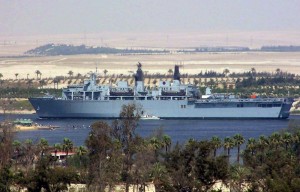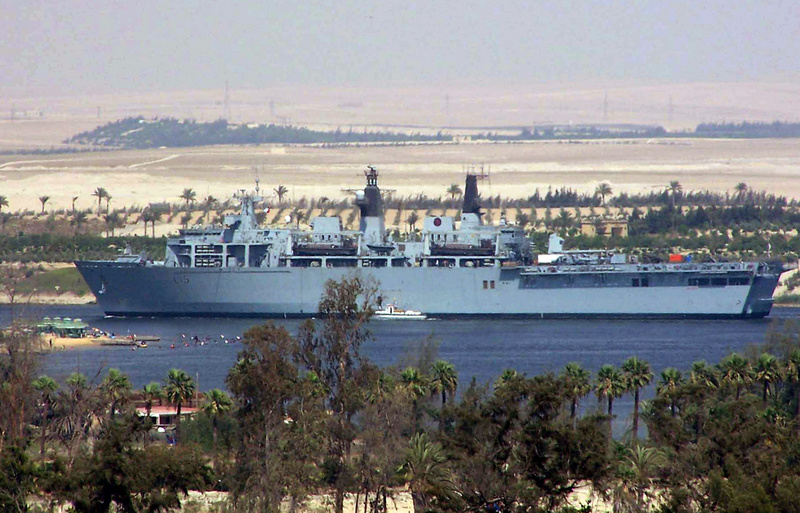
(AFP Photo)
By Islam Atris, Mohamed Al-Atrush and Rihab Sabar
Plans to construct a side canal leading to the East Port Said port, at a cost of $140m, are currently being re-assessed and reviewed, according to Ibrahim Youssef, advisor to the Minister of Transport in the Maritime Transport Sector (MTS).
Negotiations are currently underway, he said. The Suez Canal Container Terminal is to increase its share in the project’s implementation, currently estimated at $27m, adding that relevant government agencies have been contacted and asked to work to achieve this end.
The width of the canal is not expected to exceed 250 metres, and would be wide enough for just one ship to pass through at a time, a process which takes two hours back and forth. This requires ships outside the canal to wait four hours before crossing, a fact which would increase the overall cost of transport. The ministry has, therefore, called on experts to restructure the canal and decrease its overall cost.
Youssef stated that a delegation from the Dutch embassy recently visited the ministry to discuss ways in which the Dutch government and investors can contribute to the Suez Canal Project and the side canal leading to Port Said.
He added that the Ministry was looking to put in place a comprehensive vision to develop the country’s ports and improve their efficiency at a time when Egypt’s ministries and government agencies are suffering from a number of obstacles and problems. He stated that much of the country’s legislation that is drafted regarding these issues is contradictory and confusing, a fact which goes against MTS’s vision for the sector.
Previous measures to improve the sector, put in place by MTS over 5 years ago, have yet to be implemented, Youssef said, a fact which highlights the need for those operating within the sector today to move even quicker in order to construct a long term vision for the future.
MTS’s current plan relies on administrative restructuring and renovation, and generating new incentives for investors in accordance with the new plan.
Another pillar on which the project rests is related to its technical aspects, which include assessments of the state of port drafts, hulls and wharves and ways in which they can be improved. The administration of assets of government authorities operating within the market and contradictions found in legislation regarding the sector will also be reviewed, Youssef stated.
He complained that there exists no consistency with regards to decisions and laws made regarding the sector, with the exception of a series of ministerial decisions released in 2003. This is particularly the case for decisions made regarding tariffs and service and price fees, such as decision number 520. As of now however, each port applies these decisions according to its own standards.
Youssef attributed the lack of implementation of such laws to the fact that they remain largely unclear to those operating within the sector. He noted that many tariffs lack legal foundations and are applied only on order from the ministry. Any tariff laws that do exist fall under the jurisdiction of the High Ports Authority, which is the only power with the authority to pass such legislation.
The final pillar regarding MTS’s new project has to do with investment in the country’s ports. Youssed estimated that 90% of contracts signed with the private sector regarding investment in the country’s ports were plagued with problems and required reform. Clarification regarding various clauses in a number of contracts, along with the timetable for their implementation would also be required, he added.
He stated that a number of contracts signed during the era of the previous regime within the country’s dispute settlement committee, such as those involving Sonkar, the Dubai Ports, DEPCO and East Port Said, were eventually declared null and void by the country’s judiciary.
He stated that MTS’s new plan and vision for the country’s ports took into account and sought to address mistakes made in the past regarding investment, and that efforts were currently being exerted to draft one unified code and simplify its implementation in order to avoid such mistakes in the future.
Youssef said that the application of usufruct land laws had become particularly problematic, the contents of which differ in free zones from that of ports, a fact which he claims is a waste of state resources.
The ministry’s failure to implement its one stop shop policy, as decided upon in 2007 within the ports of Damietta and Alexandria, has also proved to be a large stumbling block for investors seeking entry into Egypt’s ports. This policy was supposed to be implemented by the Integrated Business Solutions Company. The ministry has stated that implementation of the one stop shop system is among its top priorities.
The Integrated Business Solutions Company recently signed a contract with the Tripoli and Khoms ports in Libya to apply new systems procedures to facilitate maritime transport.
Youssef stated that the Ministry’s plan would not be limited to the Suez Canal, but would include Alexandria, Dekheila, the Red Sea and all other regions whose ports would require development in the future.
Youssef added that MTS was one of Egypt’s most promising sectors. MTS, he said, was currently seeking to merge a number of state companies operating in the maritime sector for the purpose of creating larger entities capable of better competing with their counterparts in the private sector.
Regarding the Suez Canal Project, Youssef stated that it had not yet been determined whether or not its administration would fall under the authority of the Ministry of Transport. As of now, nearly 90% of port, transport and logistics projects were implemented via the ministry, he added.
He stated that MTS sought to cooperate with maritime chambers to solve problems currently being faced by the sector and better achieve the country’s national goals.
He added that the office of the presidency of the Ministry of Transport would be the body charged with addressing disputes faced between the international Damietta freight trading company, “DEPCO”, and the Damietta Ports Authority, saying that meetings had already been conducted to achieve this end.
Youssef stated that Port Tawfik in Suez, which is reserved especially for religious pilgrims, has closed a number of its maritime routes after the drowning of Peace Ship 98.




